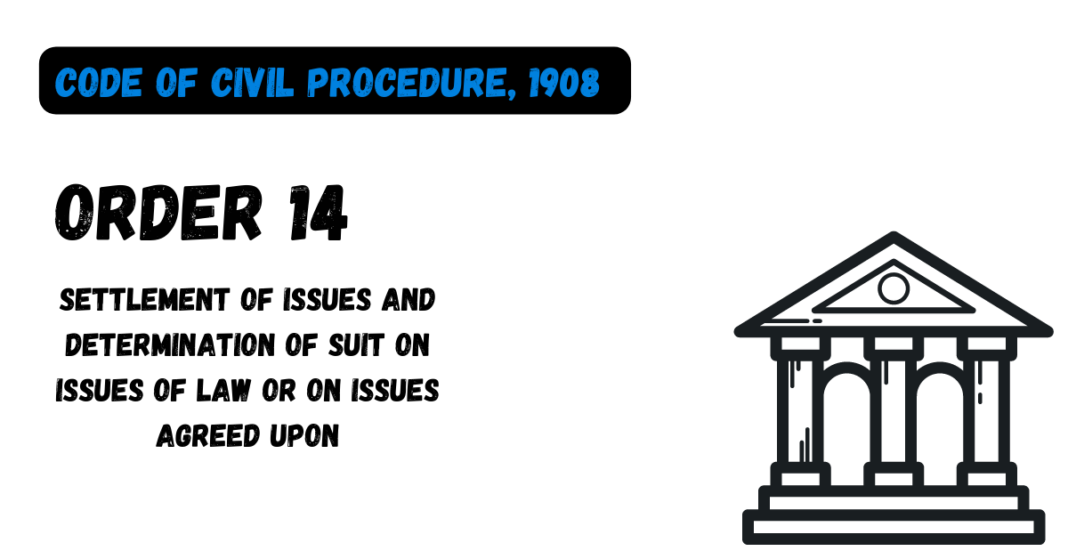1. Framing of issues.—(1) Issues arise when a material proposition of fact or law is affirmed by the one party and denied by the other.
(2) Material propositions arc those propositions of law or fact which a plaintiff must allege in order to show a right to sue or a defendant must allege in order to constitute his defence.
(3) Each material proposition affirmed by one party and denied by the other shall form the subject of distinct issue.
(4) Issues are of two kinds: (a) issues of fact,
(b) issues of law.
(5) At the first hearing of the suit the Court shall, after reading the plaint and the written statements if any, and after examination under rule 2 of Order X and after hearing the parties or their pleaders, ascertain upon what material propositions of fact or of law the parties are at variance, and shall thereupon proceed to frame and record the issues on which the right decision of the case appears to depend.
(6) Nothing is this rule requires the Court to frame and record issued where the defendant at the first hearing of the suit makes no defence.
2. Court to pronounce judgment on all issues.—(1) Notwithstanding that a case may be disposed of on a preliminary issue, the Court shall, subject to the provisions of sub-rule (2), pronounce judgment on all issues.
(2) Where issues both of law and of fact arise in the same suit, and the Court is of opinion that the case or any part thereof may be disposed of on an issue of law only, it may try that issue first if the issue relates to—
(a) the jurisdiction of the Court, or
(b) a bar to the suit created by any law for the time being in force,
and for that purpose may, if it thinks fit, postpone the settlement of the other issues until after that issue has been determined, and may deal with the suit in accordance with the decision on that issue.
3. Materials from which issues may be framed.—The Court may frame the issues from all or any of the following materials:—
(a) allegations made on oath by the parties, or by any persons present on their behalf, or made by the pleaders of such parties;
(b) allegations made in the pleadings or in answers to interrogatories delivered in the suit;
(c) the contents of documents produced by either party.
4. Court may examine witnesses or documents before framing issues.—Where the Court is of opinion that the issues cannot be correctly framed without the examination of some person not before the Court or without the inspection of some document not, produced in the suit, it may adjourn the framing of issues to a day not later than seven days and may (subject to any law for the time being in force) compel the attendance of any person or the production of any document by the person in whose possession or power it is by summons or other process.
5. Power to amend and strike out, issues.—(1) The Court may at any time before passing a decree amend the issues or frame additional issues on such terms as it thinks fit, and all such amendments or additional issues as may be necessary for determining the matters in controversy between the parties shall be so made or framed.
(2) The Court may also, at any time before passing a decree, strike out any issues that appear to it to be wrongly framed or introduced.
6. Questions of fact or law may by agreement be stated in form of issues.—(1) Where the parties to a suit are agreed as to the question of fact or of law to be decided between them, they may state the same in the form of an issue, and enter into an agreement in writing that, upon the finding of the Court in the affirmative or the negative or such issue,—
(a) a sum of money specified in the agreement or to be ascertained by the Court, or in such manner as the Court may direct, shall be paid by one of the parties to the other of them, or that one of them be declared entitled to some right or subject some liability specified in the agreement;
(b) some property specified in the agreement and in dispute in the suit shall be delivered by one of the parties to the other of them, or as that other may direct; or
(c) one or more of the parties shall do or abstain from doing some particular act specified in the agreement and relating to the matter in dispute.
7. Court, if satisfied that agreement was executed in good faith, may pronounce judgment.—
Where the Court is satisfied, after making such inquiry as it deems proper,—
(a) that the agreement was duly executed by the parties,
(b) that they have a substantial interest in the decision of such question as aforesaid, and
(c) that the same is fit to be tried and decided, it shall proceed to record and try the issue and state its finding or decision thereon in the same manner as if the issue had been framed by the Court;
and shall, upon the finding or decision on such issue, pronounce judgment according to the terms of the agreement; and, upon the judgment so pronounced, a decree shall follow.





